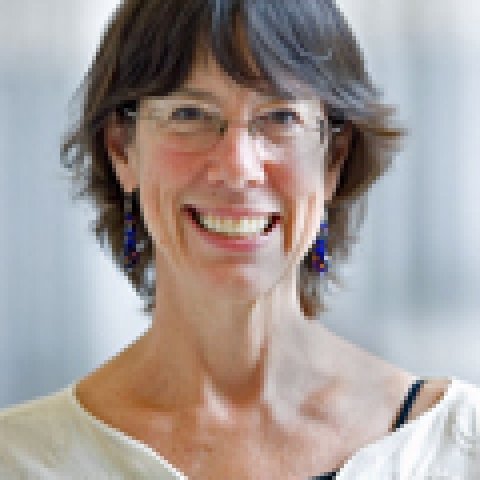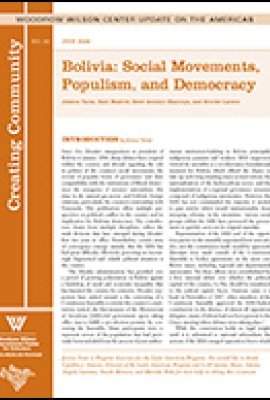Brooke Larson
Fellow
Professional Affiliation
Professor, Department of History, Stony Brook University
Expert Bio
My interest in Latin America was born in the mid-1960s in rural Pátzcuaro, Mexico, where I taught an adult literacy class to young Tarascan women. That experience, along with the tenor of the times, helped shape the scholarly agenda I was to follow for the next decades-—the study of colonial power relations, agrarian problems, peasant livelihood and resistance, and indigenous mobilizations. My first major research project examined the long-term transformation of native Andean society under the impact of Spanish imperial politics and economics in the Andean region of Cochabamba, an agrarian hinterland of the great colonial silver mines of Potosí. That research project resulted in my book, Colonialism and Agrarian Transformation in Bolivia: Cochabamba, 1550-1900 (Princeton: Princeton University Press, 1988). The book provides a historical panorama of socioeconomic and cultural change under Spanish colonial rule. Specifically, it shows how the contradictions of class and colonialism eventually gave rise to new peasant, artisan, and laboring groups that challenged the evolving structures of colonial domination. The book's second, expanded edition (Duke University Press, 1998) included a new final chapter that harnessed the new cultural and political historiography of the 1990s to the original historical template, by exploring grassroots questions about Quechua popular culture and identity politics. During my early professional career, the Social Science Research Council (SSRC) provided me a unique opportunity to promote collaborative research projects in Andean Studies and, more generally, in Latin American Studies. As director of the Council's Latin American and Caribbean program (1981-1984), I worked with an international community of Latin Americanists on a wide range of interdisciplinary themes, including the development of the (then) exciting new field of Andean Ethnohistory. Under the auspices of the SSRC, we launched an ambitious tripartite project in Andean Studies that eventually produced three different international conferences and their respective volumes. I was most directly involved in the SSRC's 1983 conference on "Market Penetration and Social Transformation in the Andes, 16th-20th centuries." One of our goals was to open up new channels of scholarly dialogue in the Andean region, so we decided to hold an international scholarly conference at the National Archive in the Bolivian city of Sucre. That conference produced the wonderful outcome of making local scholars and indigenous intellectuals an essential part of the emerging scholarly community in Andean Studies. More tangibly, the project yielded a large conference volume, entitled La participaciòn indígena en los mercados surandinos, siglos XVI-XX (La Paz: CERES, 1987). Several years later, my co-editors and I published an updated and substantially revised, English-language version, titled Ethnicity, Markets, and Migration: At the Crossroads of History and Anthropology (Durham: Duke University Press, 1995). During the 1990s, I embarked on a new collaborative research project, as part of the scholarly events marking the 500th anniversary of Europe's arrival in the Americas. Around 1992, Cambridge University Press launched the Cambridge History of the Native Peoples of the Americas -—a multi-volume study of indigenous histories and cultures throughout the hemisphere from ancient times to the present day. What began as a modest assignment by the editors to write about "Indian responses to independence and liberalism" in the nineteenth-century Andes became, for me, a wonderful challenge to rethink the whole sweep of postcolonial Andean history from state-centered, regional, and indigenous perspectives. My book, Trials of Nation Making: Liberalism, Race, and Ethnicity in the Andes, 1810-1910 (Cambridge: Cambridge University Press, 2004), is the product of that effort. Building on three decades of interdisciplinary work by Andean scholars, including myself, it offers a comparative synthesis of indigenous political cultures and their tense interactions with the emerging republics of Colombia, Ecuador, Peru, and Bolivia during the turbulent nineteenth century. Although my research interests have moved through three historiographical chunks of time (colonial, 19th century, and the 20th century), I have always been interested in the articulation of evanescent political events and the longue durée. Hence, my earlier books encompassed long sweeps of time, while attending to the complexities and contingencies of Andean political history and social practice. That approach has allowed me to examine deep (neo)colonial continuities--often dubbed "the colonial heritage"--which have permeated rural relations of power and also shaped indigenous "ethnic" politics under modernizing nation states. From this perspective, Trials of Nation Making has provided an excellent segue into my Wilson Center research project, "Aymara Indians and the Lettered City", which focuses on Indian mobilization, the contest over social citizenship, and the role of education in forging multicultural models of nationhood in the 20th century. Fellowships from the John Simon Guggenheim Foundation and the Woodrow Wilson Center will enable me to complete the research and draft the book. As always, my aim is to make my work available not only to scholars in the Anglophone world, but to local intellectuals, university students, and popular groups currently engaged in grassroots citizenship and educational projects in the Andean world.
Education
B.A. (1970) City University of New York; M.A. (1972) Columbia University; Ph.D. (1978) Columbia University
Subjects
Latin America,Bolivia
Experience
- Professor of History, Stony Brook University, 1999-present
- Associate Professor of History, Stony Brook University, 1988-99
- Director, Latin American and Caribbean Center, Stony Brook University, 1994-97
- Assistant Professor of History, Stony Brook University, 1984-88
- Director, Latin American Program, Social Science Research Council (SSRC), 1981-83
- Visiting Assistant Professor, History, Columbia University, 1979-81
- Faculty, Seminar College, New School for Social Research, 1978-81
- Assistant Professor, Williams College, 1976-78
Expertise
Colonialism and nation making in Latin America; Andean peasant studies; Bolivian history; contemporary ethnic mobilizations
Wilson Center Project
"Aymara Indians and the Lettered City: Struggles over Power, Knowledge, and Identity in the Bolivian Andes"
Project Summary
In this book-project, I use the stark landscape of rural highland Bolivia to explore the larger question that has haunted the Andean region for almost two centuries--how to imagine and engineer multicultural democracies in unruly societies cleaved by social and ethnic inequalities. To date Bolivia continues to struggle with questions of citizenship and equality for its indigenous majority. My book traces the origins and evolution of Aymara Indian mobilizations for communal lands, literacy and schools, and participatory rights in the early-to-mid 20th century, and explores the larger impact of that indigenous movement on Bolivia's unfolding national debates on the meanings of democracy, civil society, and citizenship in this multicultural context. I will also explore the implications of this history for rethinking contemporary indigenous politics in Bolivia and perhaps elsewhere in the Andes.
Major Publications
- "Capturing Indian Bodies, Hearths, and Minds: the Gendered Politics of Rural School Reform in Bolivia, 1920s-1940s" In Andrew Canessa, ed., Natives Making Nation: Gender, Indigeneity, and the State in the Andes Tucson: University of Arizona Press, 2005, pp. 32-59
- "Redeemed Indians, Barbarianized Cholos: Crafting Neocolonial Modernity in Early 20th Century Bolivia" In N. Jacobsen and C. Aljovín, eds., Political Cultures of the Andes, 1750-1950 Durham: Duke University Press, 2005, pp. 230-252
- Trials of Nation Making: Liberalism, Race, and Ethnicity in the Andes, 1810-1910 (Cambridge: Cambridge University Press, 2004)
- Cochabamba, 1550-1900: Colonialism and Agrarian Transformation in Bolivia, Durham: Duke University Press, 1998. , xxvii + 422 pp. (Expanded edition of the original 1988 Princeton University Press edition; with a new prologue, final chapter, and forward by William Roseberry.)
- Ethnicity, Markets, and Migration in the Andes: At the Crossroads of History and Anthropology, Co-edited with O. Harris and E. Tandeter, (Durham: Duke University Press, 1995)


